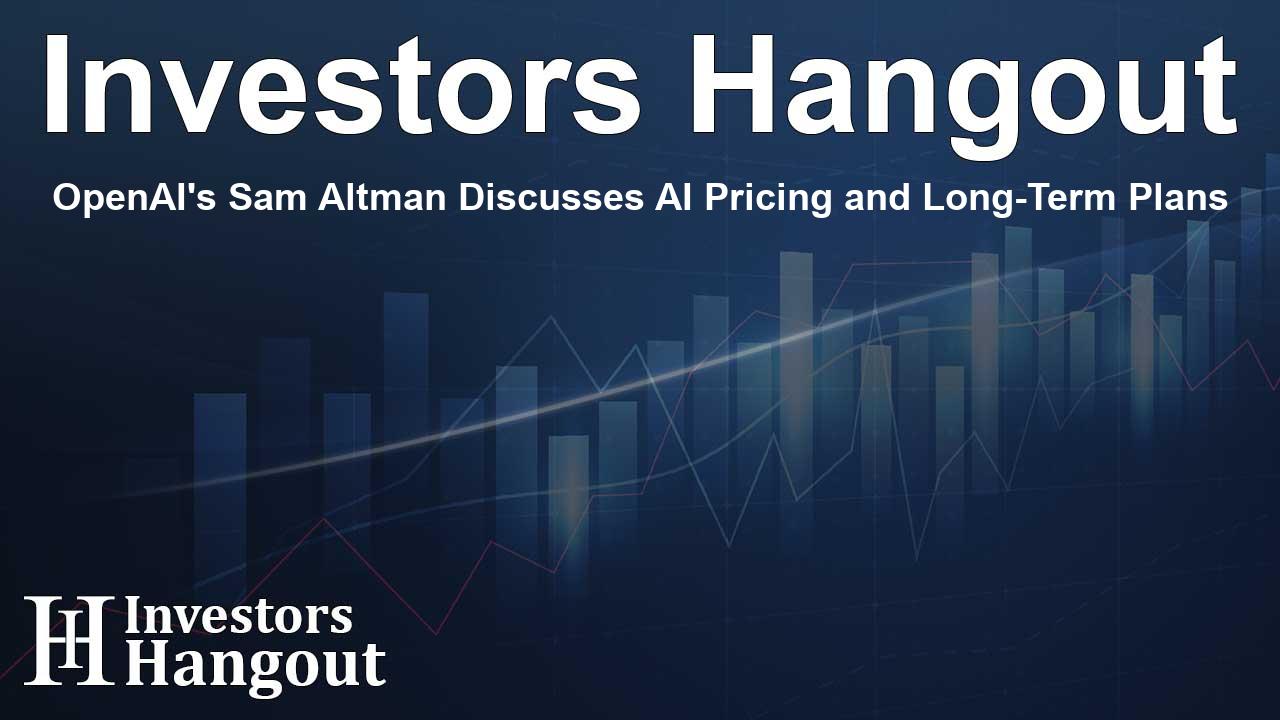OpenAI's Sam Altman Discusses AI Pricing and Long-Term Plans

Understanding the AI Pricing Landscape
In today's rapidly evolving digital world, advancements in artificial intelligence are attracting attention from all corners, and a significant voice in this conversation is Sam Altman, CEO of OpenAI. Recently, Altman addressed growing concerns regarding the affordability and accessibility of AI tools, particularly for free users.
Paid Features and Their Rationale
During a discussion on social media, Altman noted the upcoming restrictions on certain AI features, highlighting that they're primarily geared towards paying users due to the substantial computational costs associated. His remarks emphasized OpenAI's ambition to eventually lower these costs over time.
Altman specified that new offerings, which are compute-intensive, will initially be available for Pro subscribers only. Furthermore, this shift to a subscription model indicates a broader strategy to explore the extensive capabilities of AI while ensuring financial sustainability.
Insights on the Future of AI Technology
Despite the current limitations, Altman reassured the public that OpenAI's ultimate aim is to expand access to their powerful AI offerings. He stated, "Our intention remains to drive the cost of intelligence down as aggressively as we can and make our services widely available." This reflects a commitment to both technological growth and user accessibility.
Navigating Potential Risks in AI Development
Interestingly, Altman’s insights also align with warnings from OpenAI's Chairman, Bret Taylor, regarding the potential for an inflated bubble in the AI sector. This thought echoes sentiments about the tech industry's growth in the late 1990s, leading to a boom and subsequent bust.
Valuation Concerns in the AI Sector
Taylor expressed concerns about inflated valuations in the AI market, though he reassured stakeholders that similar to tech giants that rose from the dot-com ashes, enduring companies will emerge in the AI landscape. This underscores the need to approach advancements with caution and foresight.
Fostering In-House Innovation
As part of their innovation strategy, OpenAI is reportedly preparing to develop its proprietary hardware, marking a significant shift in its operational structure. This move is intended to reduce reliance on NVIDIA Corporation, with whom they have had a long-standing dependency. OpenAI is collaborating with Broadcom Inc., actively engaged in the mass production of custom AI chips.
These chips are anticipated to further streamline OpenAI’s operations while creating a more robust infrastructure for future developments. The deal, reportedly valued at $10 billion, positions OpenAI at the forefront of chip innovation.
Demand for Custom Technology Solutions
Broadcom's CEO has corroborated this transition, noting the surge in demand for semiconductors driven by the partnership with OpenAI. Such advancements not only benefit OpenAI but also contribute significantly to the broader tech ecosystem, emphasizing the importance of collaboration in tech advancement.
Conclusion: A Forward-Looking Perspective
In summary, Sam Altman's insights provide a dual perspective on the current and future state of AI technology. As OpenAI navigates the challenges of affordability and accessibility while preparing for significant innovations in hardware, the industry watches closely. The outcomes of these strategic decisions may very well shape the trajectory of AI development and its integration into society.
Frequently Asked Questions
What recent comments did Sam Altman make regarding AI tools?
Sam Altman discussed the high compute costs associated with AI tools and indicated that new features will be limited to paying users initially.
How does OpenAI plan to make its services more accessible?
Altman emphasized the company's intention to drive down costs aggressively over time to ensure wider availability of their AI tools.
What is the significance of OpenAI's partnership with Broadcom?
The partnership aims to produce proprietary AI chips, reducing OpenAI's reliance on NVIDIA and enhancing its technological capabilities.
How does Bret Taylor view the current AI market?
Bret Taylor warns of potential overvaluation in the AI sector, comparing it to the dot-com bubble, but believes durable companies will emerge.
What are the implications of custom hardware development for OpenAI?
The move towards in-house chip production is expected to streamline operations and elevate OpenAI's competitive edge in the technology landscape.
About The Author
Contact Dylan Bailey privately here. Or send an email with ATTN: Dylan Bailey as the subject to contact@investorshangout.com.
About Investors Hangout
Investors Hangout is a leading online stock forum for financial discussion and learning, offering a wide range of free tools and resources. It draws in traders of all levels, who exchange market knowledge, investigate trading tactics, and keep an eye on industry developments in real time. Featuring financial articles, stock message boards, quotes, charts, company profiles, and live news updates. Through cooperative learning and a wealth of informational resources, it helps users from novices creating their first portfolios to experts honing their techniques. Join Investors Hangout today: https://investorshangout.com/
The content of this article is based on factual, publicly available information and does not represent legal, financial, or investment advice. Investors Hangout does not offer financial advice, and the author is not a licensed financial advisor. Consult a qualified advisor before making any financial or investment decisions based on this article. This article should not be considered advice to purchase, sell, or hold any securities or other investments. If any of the material provided here is inaccurate, please contact us for corrections.
